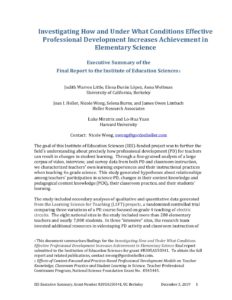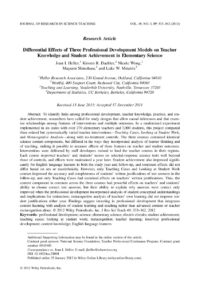Teacher participation in just 24 hours of MSS science content PD resulted in statistically- significant improvements in student learning outcomes. Additionally, analysis of classroom video showed statistically-significant differences in student cognitive engagement, student engagement in scientific sense-making practices, and teacher elicitation of and attention to student thinking.
This executive summary describes the analysis of 3 professional development models, resulting in shifts in classroom instructional practices observed in videos using a classroom observation rubric, and the resulting effects on student achievement on a test.
Data for the study of classroom practices came from 30 randomly selected focal teachers from the experimental and control groups originating from a 2012 nationwide randomized control trial involving, 8 sites, 280 elementary teachers, and ~7,000 4th grade students.

- Author: Judith Warren Little, Elena Durán López, Anna Weltman, Joan I. Heller, Nicole Wong, Selena Burns, James Owen Limbach, Luke Miratrix, Lo-Hua Yuan
- Type: Executive Summary — Institution of Education Sciences — Grant #R305A150341
- Pages: 13
- Publication Date: December 2019
- Topics: Elementary
